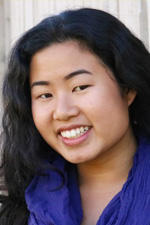
Alexa Mark
Theatre

- Profile
Profile
When Alexa was accepted to UC San Diego as a freshman, she was ready “to not do anything to stand out. I did so much leadership in high school.” Her friend’s mother quashed that idea, telling her, “You’re never going to be a follower. That’s just not you.”
“By the time my first quarter at UC San Diego was over,” says Alexa, “I had assistant-directed a one-act play, was chosen to direct Moliere’s play Tartuffe, was on the council for my residence hall, and volunteered to sing for Marshallpalooza, conquering my immense fear of singing for a crowd.” Also, “at this school where everyone seems like a genius, I’ve been able to get all A’s every quarter thus far. I’ve amazed myself because these classes have been hard, but I’ve put in the work and dedication.”
Alexa has an office job where she’s learning what it takes to fund the arts and humanities, and she’s taken on the responsibilities of resident advisor for 50 students in Revelle College. “It’s proof that being a leader does not always mean that you’re in front of a crowd, riling them up. It could mean that you’re just a person who people can go to and talk about anything. I care too much to not be a leader. I had no idea that I would be doing all these amazing things by my second year of college.”
Including activism. “After interning for a year with California Assembly member Jim Cooper and self-educating myself in topics such as LGBTQIA+ rights, gun violence prevention, reproductive rights, intersectionality and mental health, I have become determined to help bring these issues to light. These are very important to me, and I have been able to learn more and engage in these issues through my Dimensions of Culture classes, as well as campus organizations and protests.”
A natural performer from a young age, in high school Alexa began to experience the hurt of not belonging. “I don’t think anyone was consciously trying to exclude me, it just happened. I wasn’t rich and white. I couldn’t afford voice lessons, dance classes or a private school. The theatre world was not a welcoming place for people like me.”
Still, she persisted. Though she works part time in addition to attending classes, she’s found herself drawn to opportunities in theatre outside of acting. Through creative work such as her UC San Diego production of Sisters Matsumoto by Philip Kan Gotanda, she says, “I want to be able to tell the stories of people who are so often forgotten in the media. And after directing, working in production and development, I quickly realized that my calling is to be a director, producer, casting director or some fabulous combination of all three. Why? I don’t want more people to feel the way I did. I nearly stopped doing theatre because I felt like I wasn’t meant for it. If I can make just one person feel like they belong in theatre, that’s worth it.”
